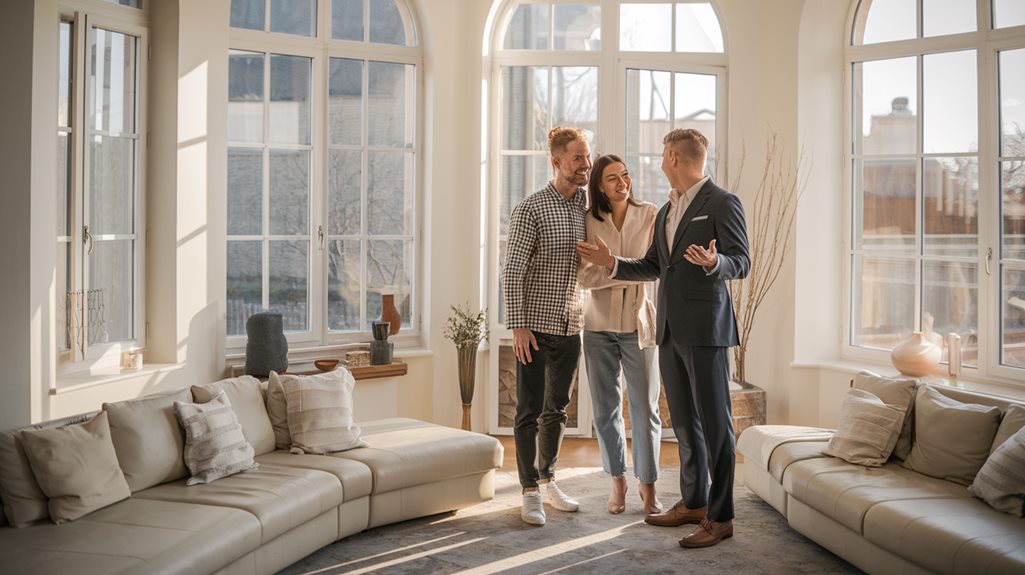Buying your first home is a big deal! It's not just about finding a nice place to live. You need to plan ahead.
First, think about how much money you can spend. Make sure to include all the costs, not just the price of the house. Check your credit score too. A good score helps you get a better loan. It's also smart to get pre-approved for a mortgage. This tells you how much money you can borrow.
Next, think about where you want to live. Choose a spot that fits your way of life. Make a list of things you really want in your new home. It's also a good idea to find a real estate agent. They can help you a lot!
Always check the house carefully before buying. Learn about extra costs that might come up when you close the deal.
Get ready for expenses in the future too. Following these steps will help you make the best choice for your first home!
Ready to start building equity in your own Michigan home? Get your personalized home loan quote today.
Determine Your Budget

When you want to buy your first home, the first thing you need to do is figure out your budget.
Start by thinking about how much money you can spend. This includes your down payment, but remember there are other costs too, like closing fees and fixing things in your new home.
Use simple ways to keep track of your money. Look at different ways to pay for your home to find what works best for you.
It's also good to know what's happening in the housing market because that can change how much homes cost.
By planning carefully and making smart choices, you can find a home that you can afford.
Plus, you'll be part of a nice community. A good budget is important for being a happy homeowner!
Michigan residents, unlock the door to your new home. Request your home loan quote from Treeside Financial today.
Check Your Credit Score
Checking your credit score is very important when you're buying a home. Start by looking at your credit report closely. This will help you see what you can do to make your score better. Remember, your credit history matters a lot and can affect the loans you can get.
Here are some easy tips to help you:
- Keep your credit card balances low. Try to use less than 30% of your total credit. This helps your score go up.
- Be careful with credit inquiries. If you ask for credit too often, it can lower your score.
- Mix up your credit types. Having different kinds of loans can make your credit look better.
| Action | Benefit |
|---|---|
| Credit Monitoring Services | Know when your score changes |
| Credit Repair Options | Fix mistakes and raise your score |
| Credit Utilization Tips | Lower usage to boost score |
| Credit Mix Strategies | Make your credit profile better |
Follow these simple steps to get ready for buying a home and to help you find a nice place to live.
Get Pre-Approved

Getting pre-approved for a home loan is super important for first-time buyers. It helps you know how much money you can borrow and what your budget should be.
When you get pre-approved, it gives you a clear idea of the homes you can afford. This way, you can look for houses that fit your price range.
Also, if you work on making your credit score better, you might get a loan with nicer terms.
Understand Loan Options
Getting a home loan can feel a bit scary at first, but it's really important to know your choices as a first-time buyer. Here are some options to think about:
- Fixed rate mortgages give you the same payment every month, which can help you plan your budget.
- Adjustable rate mortgages start with lower payments, but they can change later on.
- Government backed loans are easier to get and may help with your down payment.
- Interest rate comparison helps you find the best prices so you can save money.
- Loan term options let you pick how long you want to pay back the loan.
Don't forget about the loan application process and the types of mortgage insurance you might need. These can change how much money you spend.
It's a good idea to talk to a financial counselor. They can help you understand everything and make choices that fit your dreams. Enjoy this exciting journey ahead!
Determine Budget Limits
Once you look at your loan choices, the next step is to figure out how much money you can spend. This is a really important part of buying a home. First, think about what you want and what you can really afford. Look for homes that fit your life and your money situation.
It's also smart to save money and keep some aside for emergencies in case something unexpected happens. Keeping track of what you spend can help you manage the costs of owning a home.
Here's a simple chart to help you see where your money goes each month:
| Category | Monthly Amount | Notes |
|---|---|---|
| Mortgage Payment | $XXX | This is what you pay for the loan |
| Utilities | $XXX | This includes gas, water, and electricity |
| Maintenance | $XXX | This is for repairs and keeping things nice |
| Savings & Emergency | $XXX | This is your rainy day fund |
Try to make a budget that helps you feel secure and happy in your new neighborhood. Remember, being smart with your money can help you enjoy your new home for a long time.
Improve Credit Score
Having a good credit score is really important if you want to get a mortgage. To make your score better, you can change some of your money habits. Here are some simple ways to help improve your score:
- Credit Utilization: Try to use less than 30% of your available credit. This shows that you use credit wisely.
- Payment History: Always pay your bills on time. This helps keep your record clean and positive.
- Credit Inquiries: Don't ask for new credit too often. Too many inquiries can hurt your score.
- Debt Management: Make a budget to help you pay off your debts. This will help you feel more in control of your money.
- Credit Mix: Having different types of loans can help improve your credit score.
Check your credit regularly so you know how you're doing.
Decide on Location
Choosing where to live is very important when you buy your first home. The right place can make you happy and help your house be worth more later.
Look for fun things nearby, like parks and stores, that you'd enjoy. Think about how long it takes to get to work or other places you go often. If you have kids or plan to, check out the schools in the area. Good schools help your child learn and can make your home worth more.
Also, see if there are any new buildings or projects coming up that could change your neighborhood. It's good to know about safety, too. You want to feel safe and comfortable where you live.
Lastly, think about how friendly the community is. A nice, active neighborhood can help you feel like you belong and make your new house feel like home.
Prioritize Your Needs

When you buy your first home, it's important to think about what you really need. It's not just about getting a house; it's about finding a place that feels right for you.
Here are some things to think about:
- Must-have features: What're the things you really want? Maybe you need a home that saves energy or has a nice yard.
- Lifestyle priorities: Think about how far you need to travel for work or if you have pets that need space.
- Neighborhood amenities: Look for a place that's close to parks, stores, and buses or trains.
- School districts: If you have kids or want to have them one day, good schools are very important.
- Future resale: Think about how much your house might be worth later on.
Research Mortgage Options
Now that you know what you want in your new home, it's time to look at money matters—this means checking out mortgage options.
First, learn about fixed rates and adjustable rates. Fixed rates mean your payment stays the same, which is nice for planning. Adjustable rates might start lower, but they can change later.
Next, compare different lenders. Look at their interest rates and how long you want to pay back the loan. The size of your down payment can affect whether you need mortgage insurance, so think about that too.
Before you apply for a mortgage, get your financial papers in order. This will help the closing process go smoothly.
Take your time to shop around for the best rates that fit your budget. By doing your homework, you'll understand what you're getting into with your money and feel more at home in your new neighborhood.
Hire a Real Estate Agent

Buying a home can feel really hard and scary. But if you get a real estate agent, they can help you a lot. They know a lot about homes and can make the whole process easier for you.
They'll be there to help you every step of the way, making sure you understand everything.
Here are some reasons why having an agent is a good idea:
- They handle all the tricky paperwork, so you don't have to worry.
- They're good at talking and can help you get a better price.
- They know about homes that you mightn't find by yourself.
- They can tell you what's happening in the housing market.
- They can explain how agent fees work in a simple way.
Choosing a real estate agent can make buying a home much easier.
They'll help you find the right place and make sure you enjoy the journey of finding your new home!
Schedule Home Inspections
Getting a home inspection is really important.
It helps you find problems that you mightn't see when you just look around the house. If you know about these issues, you can talk to the seller and ask them to fix things or lower the price.
Don't skip this step! It can save you a lot of money and trouble later on.
Identify Potential Issues
When you want to buy a house, it's really important to check for problems first. A home inspection can help make sure your new home is safe.
Here are some things to look for:
- Foundation issues: Look for cracks. These can be expensive to fix.
- Plumbing problems: Check for leaks. Old pipes might need to be replaced.
- Electrical issues: Bad wiring can be dangerous.
- Pests: Bugs like termites or mice can hurt the house.
- Roof problems: Missing shingles or leaks need to be fixed right away.
Also, think about how safe the neighborhood is.
Make sure you know where the property lines are. Check the rules about building in the area and look out for any dangers, like floods.
Make sure there are no problems with ownership of the house. Taking care of these things will help you make a smart choice for your future home!
Negotiate Repair Costs
When you find problems in a home, it's important to talk about repair costs. This way, you can make sure you're getting a good deal.
Talking with the seller about repairs can help you save money and make sure the home is what you want. First, get an estimate from a professional about how much the repairs will cost.
This estimate gives you good information to use when you talk to the seller. It helps you stand up for yourself and get a fair deal.
Understand Closing Costs

When you buy a home, it's important to know about closing costs. These are extra costs that can surprise new buyers. If you learn about these costs and what you need to pay, you can avoid money worries.
Usually, closing costs are about 2% to 5% of the price of the house. Here are some of the things these costs might include:
- Loan fees: This is money you pay to the bank for helping you get a loan.
- Appraisal fees: This is money you pay to find out how much the house is worth.
- Title insurance: This helps protect you from someone saying they own the house later on.
- Property taxes: You might need to pay some of these when you close the deal.
- Home insurance: This is often needed to protect your new home, and you usually pay for it upfront.
Knowing about these costs can help you feel more sure and part of the home-buying process.
When you understand what you have to pay, you can make better choices.
Plan for Future Expenses
When you buy a home, it's not just about the money you pay at first. You need to think about other costs that come later. Things like fixing leaks or painting the walls can pop up when you least expect it.
Planning for these costs helps you keep your home safe and cozy for you and your family.
One way to get ready is to use budgeting tools. These tools help you see how much money you spend each month and each year. This way, you can save money for any surprise costs that might come your way.
It's also smart to build an emergency fund. This is like a piggy bank for emergencies. If something breaks, you'll have money ready to fix it.
When you plan for these future expenses, you can relax and enjoy your home more. You'll feel like you belong to a group of smart homeowners who take care of their houses and keep their families safe.







